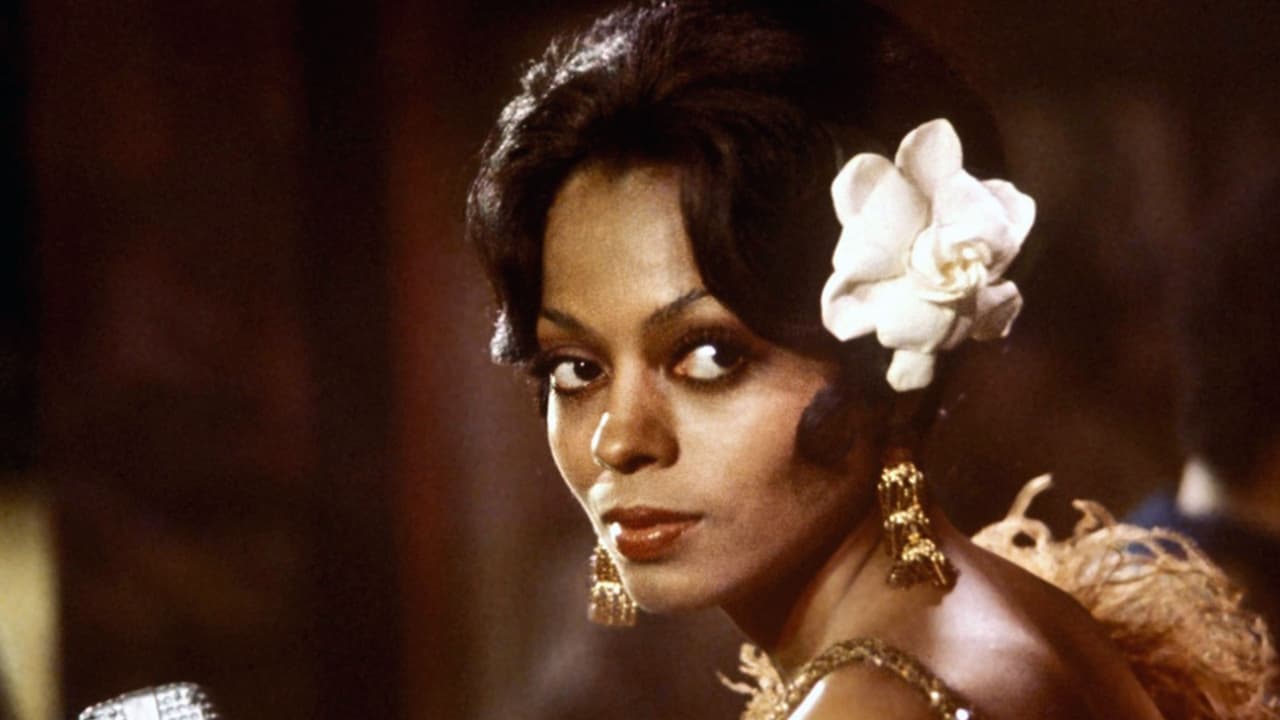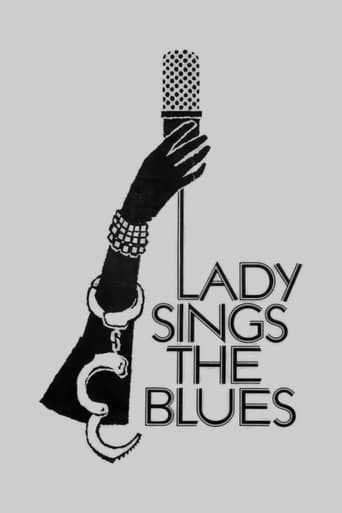

She is playing the "Miss Ross" idea of Billie Holiday--she doesn't even attempt to sing like Billie. A shameful showcase for "Miss Ross" and a disservice to "Miss Holiday. Dreadful.
... View MoreLady Sings The BluesThe thing that makes jazz musicians different from other musicians is they do their drugs before they perform.In fact, the singer in this drama did drugs constantly.Abused by men most her life, Billie Holiday (Diana Ross) abandons the brothel where she works for a nightclub where she accompanies the piano player (Richard Pryor).Her unique voice quickly attracts a suitor (Billy Dee Williams) as well as A&R types who sign her to a radio tour.Being on the road, however, only exposes Billie to the racial inequality crippling the country and the intravenous drug that will eventually enslave her.With Diana Ross' captivating performance as Billie both on and off the stage, this 1972 adaptation of Holiday's own biography is a heartbreaking account of her arduous life and untimely demise.And while drug use in Jazz may still be rampant no one cares enough to check.Yellow Lightvidiotreviews.blogspot.ca
... View MoreIn continuing my reviews of African-Americans in film in chronological order for Black History Month, we're now at 1972 with the biographical depiction of Billie Holliday as portrayed by Diana Ross called Lady Sings the Blues. While the movie itself isn't very accurate in recounting Lady Day's life and career and Ms. Ross herself hardly resembles the legendary singer, it does move along nicely as a drama especially with two of her costars-Billy Dee Williams and Richard Pryor-providing many scene stealing moments. As Holiday's lover Louis McKay, Williams oozes great romantic chemistry with Ross as we see him trying to get her out of whatever addictions she keeps coming back to. Then there's Pryor as Piano Man as we see many of his humorous moments, with or without Diana, bring some needed levity whenever things get heavy though there's some good drama concerning him at the end. Other black performers I'd like to mention include: Isabel Sandford as the first madame that Holiday encounters as we see her tell Billie she can keep the record she keeps playing. She was already familiar to TV viewers as Louise Jefferson on "All in the Family" which would later spin her off into "The Jeffersons". Then there's Lynn Hamilton as the second madame Ross encounters. Ms. Hamilton would later that year or next become familiar as Fred Sandford's girlfriend Donna Harris on "Sandford and Son". Harry Caesar plays a really creepy man who forces himself on teenage Billie in perhaps the movie's most chilling scene. There's also Jester Hairston-later familiar to me as Rolly on "Amen"-as a butler and, in perhaps the most humorous scene, Scatman Crothers as Big Ben, a client that prostitute Billie quits on to go audition at a night club. Ms. Ross was the second (or third since Cicely Tyson was also nominated that year for Sounder) African-American to be nominated an Oscar for Best Actress after Dorothy Dandridge's previous nod some 18 years before. It was much deserved especially with the drug-induced depictions handled realistically by her. The songs Holiday made famous are handled by Diana in a way that brings you back to the period depicted here. When the score plays during the Ross-Williams dialogue, however, it brings me temporarily out of the period and into the obviously-made-in-'70s mode. Other than that I highly enjoyed Lady Sings the Blues and recommend it to anyone who loves a good drama with good music.
... View MoreThe recent death of Richard Pryor prompted me to look at the 2005 DVD package of 1972's "Lady Sings the Blues", which proves the then-young comedian to be a fine actor in the meaty supporting role of Piano Man. Even though he was a master stand-up comic, it's still too bad he never pursued roles of a similar dramatic caliber since he obviously had the talent. Similarly, Diana Ross never fulfilled the promise of her big screen debut in the title role as legendary jazz singer Billie Holiday (1915-59).Bearing no physical and little vocal resemblance to Holiday, Ross somehow gets under her true-life character's skin much like Joaquin Phoenix does in "Walk the Line" or Jamie Foxx in "Ray". Thirty-three years have elapsed since I first saw this movie, and it is with a certain amount of regret that I report that Ross as an actress has not been anywhere near this good since then. Granted she only has three features under her belt, 1975's "Mahogany" reflected an ego run amok, and she was disturbingly miscast in 1978's "The Wiz". From the opening scene where she is suffering through heroin withdrawal in raw, harrowing detail to her sultrier nightclub performances, she manages to be incendiary by her sheer will. She is even convincing in the early scenes where she is barely a teenager. Her vocal performances really don't evoke Holiday's earthier style, though to Ross's credit, her vivid renditions of standards such as "Mean to Me", "Fine and Mellow" and "Gimme a Pigfoot (and a Bottle of Beer)" don't sound like Supremes redux either.This achievement is all the more impressive since director Sidney J. Furie, a journeyman filmmaker at best, has surrounded Ross with an unwieldy rags-to-riches biopic that should have been edited down from its 144-minute running time. The screenplay - credited to Chris Clark, Suzanne De Passe and Terence McCloy (none of whom wrote a movie script before or since) based in part on Holiday's autobiography - plays fast and loose with the facts and piles on the clichés in true Oscar-baiting fashion. The drug-related scenes are powerful, though they eventually start to feel like condescending plot devices to make the viewer sympathize with Holiday for the persecution she experienced at the hands of abusive men and a bigoted society. Moreover, as Furie discloses on the accompanying audio commentary, the dialogue for several scenes is improvised by the actors, for example, the unnecessarily lengthy Club Manhattan sequence, where the lack of discipline becomes wearing.Contrary to the fact that Holiday's true life story has been well documented and interest in her legacy increased, the filmmakers altered events and people in order to maintain interest from what they thought were mainstream audiences at the time. Consequently, the character of Louis McKay, Holiday's love interest and eventual husband, played with toothsome charm by Billy Dee Williams, synthesizes a lot of men who came into her life and helped shape her career. The dramatized results leave out key figures of the jazz world like saxophonist Lester Young, trombonist Jimmy Monroe to whom Holiday was married, and record producer John Hammond, as well as Benny Goodman, Count Basie, Artie Shaw and Teddy Wilson--all important colleagues and mentors during the period covered in the film. Instead, we are given Holiday's story as filtered through Ross's own story, an observation confirmed by Ross herself on the accompanying 2005 making-of featurette.When the music is true to the period, it's quite wonderful, but composer Michel Legrand composed some gauzy, anachronistic interludes that sound like symphonic outtakes from his work on "Brian's Song". The costumes also have a Vegas revue feel, no surprise since designer Bob Mackie's flamboyant, early 1970's style is on full display here. For such an overlong movie, the ending feels quite truncated as newspaper clips are used to telegraph her eventual fate as Ross triumphantly sings her signature song, "God Bless the Child", in Carnegie Hall. Credit Motown mogul and Ross's Svengali, Berry Gordy, for having the fortitude, foresight and tenacity to oversee the project, and the DVD hammers that point in not only the overemphatic, only partially insightful commentary by Furie, Gordy and artists' manager Shelly Berger but also the making-of featurette which features Ross looking strangely youthful and Williams at least looking his age. There are several deleted scenes included in the DVD with no additional commentary from Furie, none refurbished and all understandably excised from the final cut.
... View More